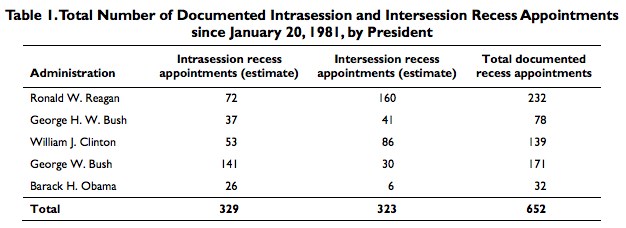
President Ronald Reagan and then-Vice President George H.W. Bush in 1981.Wikimedia
Conservative commentators have portrayed a federal appeals court’s January ruling that President Barack Obama’s appointments to the National Labor Relations Board were unconstitutional as nothing more than a stern rebuke to an out of control president. (The Washington Post‘s conservative blogger Jennifer Rubin used the word “power grab” three times in a single post, Heritage called the ruling “a blow to Obama’s imperial presidency”). But the DC Circuit Court of Appeals’ ruling—a unanimous decision by three Republican-appointed judges—is far broader than Obama’s critics have allowed, and would have invalidated the appointments of some of their favorite presidents, too.
The circuit court’s decision concerned recess appointments—temporary appointments, provided for by the Constitution, that presidents can make while the Senate, which normally has to approve many presidential appointments, is on vacation (recess, in DC jargon). For decades, presidents have used these recess appointments to bypass Senate obstruction of their nominees. Obama used recess appointments to put new members on the NLRB; George W. Bush used one to install John Bolton as his ambassador to the United Nations. But in recent years, Democrats and Republicans have tried to block recess appointments by using a procedural gimmick—two or three-minute meetings that were gaveled in and promptly gaveled back out—to keep the Senate “in session” while most Senators were actually on break.
Obama made recess appointments anyway. The court said Obama’s NLRB appointments were unconstitutional because the Senate was still technically in session—an embrace of the procedural gimmick.
That’s not all the court said, though. As I reported the day the decision was handed down, the ruling also suggests that almost all recess appointments made over the last hundred years were unconstitutional. The judges said that all recess appointments made during breaks in a session of Congress—the break Congress takes around Easter and Passover, for example—are unconstitutional. According to the court, only recess appointments that occur during breaks between sessions (which generally happen once a year, around New Year’s day) are constitutional—and only then if they are made to fill a position that became vacant during that same break. If the ruling holds, future presidents will find their ability to fill key posts over Senate objections drastically reduced.
As Talking Points Memo‘s Brian Beutler reported Tuesday, a recent Congressional Research Service report found that more than half of the recess appointments made during the presidencies of Ronald Reagan, George H. W. Bush, Bill Clinton, and George W. Bush would have been unconstitutional under the DC Circuit’s ruling. CRS found 329 recess appointments that would have been automatically forbidden because they were made during breaks in a Senate session. It also found 323 recess appointments that occurred during a break between Senate sessions, but CRS researchers were unable to determine how many of those were filled because of a vacancy that occurred during the break itself. Since vacancies are only rarely timed to coincide with Senate recesses, it seems likely that many of those recess appointments would have been unconstitutional, too.
Bottom line: Hundreds of recess appointments just in the past 30 years would have been unconstitutional under the court’s ruling. Moreover, in part because of GOP obstruction, no president in the last 30 years has used the recess appointment power less often than President Obama (from the CRS report):

If the appeals court’s ruling is correct, and most recess appointments are unconstitutional, then previous presidents violated the Constitution far more frequently than the man currently sitting in the White House.












